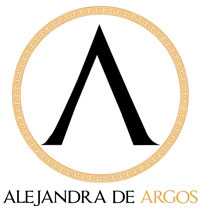Marina Abramovic (Belgrade, 1946) is one of the greatest representatives of performance art today. Among her next projects are directing the opera Seven Deaths dedicated to Maria Callas in Covent Garden and preparing for her forthcoming exhibition at the Royal Academy of Arts in London, becoming the first living artist to exhibit in the prestigious institution after Hockney, Kiefer, Ai WeiWei and Kapoor. With the help of artist Adam Lowe she is creating the pieces for the exhibition. "I am 71 years old, in the latter years of my life and I am very conscious about making this transition. I think when you die you do not go into the darkness but into the light. What we are going to try to create is a way to make me disappear into the light. The artist tells me this before we begin our conversation while I observe some of her works with translucent qualities that allow us a glimpse of life and death at the same time.
Author: Elena Cué
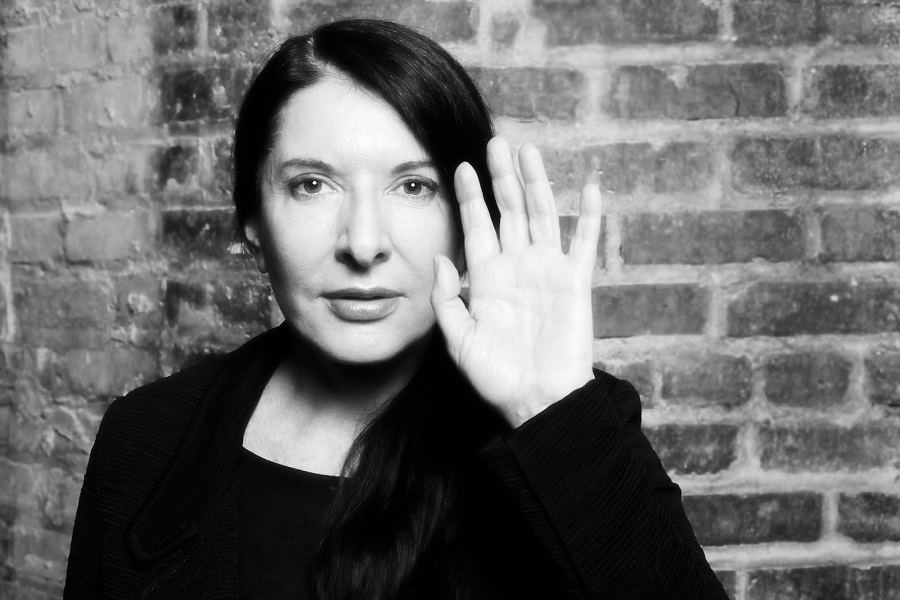
Marina Abramovic. Photo: David Leyes
Marina Abramovic (Belgrade, 1946) is one of the greatest representatives of performance art today. Among her next projects are directing the opera Seven Deaths dedicated to Maria Callas in Covent Garden and preparing for her forthcoming exhibition at the Royal Academy of Arts in London, becoming the first living artist to exhibit in the prestigious institution after Hockney, Kiefer, Ai WeiWei and Kapoor. With the help of artist Adam Lowe she is creating the pieces for the exhibition. "I am 71 years old, in the latter years of my life and I am very conscious about making this transition. I think when you die you do not go into the darkness but into the light. What we are going to try to create is a way to make me disappear into the light. The artist tells me this before we begin our conversation while I observe some of her works with translucent qualities that allow us a glimpse of life and death at the same time.
You grew up in Belgrade where your parents occupied important posts in Marshal Tito’s Communist Regime. They were prominent partisans who fought in World War II against the Axis Powers and were later proclaimed as national heroes. How do these particular circumstances manifest themselves in you and in your art?
I have to add one more component, my grandmother. My parents were busy with their careers so they just left me with her. My grandmother hated communism and Tito. She was extremely spiritual so until I was six years old I spent most of my time with her in church. My great-uncle was proclaimed a saint so I had a family that mixed both the orthodox religion and communism which is conflicting in itself. I grew up in that contradiction and my work expresses it best. At that time, I was educated not to think about my personal life. I was taught everything that is important points towards a higher purpose in your life.
What lessons were those?
My mother taught me absolute discipline while from my father I learned about heroism and not to be afraid of anybody or anything. Later on, I needed to rebel against everyone and be myself. I took the heroism, discipline, self-control and spirituality and I started to become interested in Buddhism. A mixture of all these contradictions has been reflected in my work.
In your memoir “Walk through walls” you mention that you grew up in a violent environment due to the complicated marriage of your parents. Is there any relationship between those experiences and many of your performances where violence is present?
I was never actually interested in violence itself. I like to stage painful situations in front of an audience because we are afraid of pain, mortality and suffering in our lives. By understanding pain you free yourself of the fear of pain. This was the idea. In old cultures, every single ceremony involves physical pain as it is the door to elevated consciousness that opens your mind in a different way. Even if I cut myself in the kitchen while cutting an onion, I cry like a baby but in front of an audience the blood becomes the color, the skin becomes the canvas and the knife becomes an instrument. I completely transform it into something else.
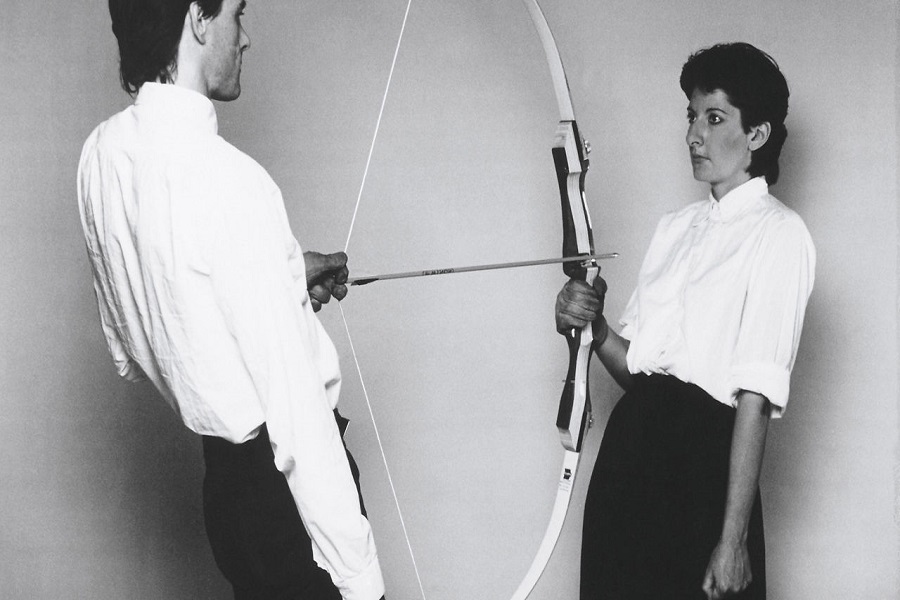
Rest Energy (1980).
There is a therapy called "paradoxical intention" that consists of inducing the patient to face his or her fear as a method of healing.
This is absolutely how I see life! We pity ourselves and it is nonsense. We have an incredible energy inside ourselves but we just do not use it. What I do is show the public that if I can do it, they can do it too. I want to be their mirror. We are so much stronger, especially us women, because we have the power to create life. We seem weak but we have that incredible power so if we play the role of being submissive, fragile and servants to men, it is because their love is very important to us. This is why I never say I am a feminist. Why should I? I already have the power.
What differentiates real life from your performances?
It is complicated to explain but when you are in your normal life, you are one person and when you step in front of the public, you use the energy of the audience which you do not normally have. That energy gives you possibilities to transcend fear and do things that you would not have the energy, courage and strength to do otherwise. It can be applied to every performance. An audience of three hundred thousand people creates an enormous amount of energy that goes through you. When the curtain falls, you simply collapse because your own energy is not enough.
How do you channel your energy when you are not creating?
Amazingly! In every molecule of our bodies we have extra energy that we never use. We only use it in a moment of total danger. I learned how to use that type of energy in front of the audience without having any kind of danger. This is the transition you make from an ordinary-self to a super-self.
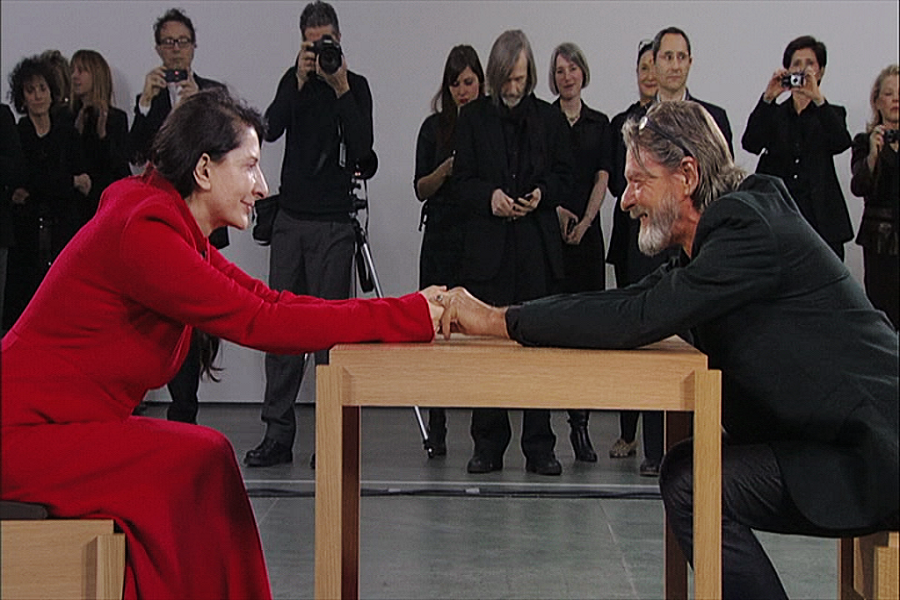
Reencuentro con Ulay en The artist is present (2010)
You discovered that your body was the tool you wanted to use to create art. What meaning do you give to the continuous exposure of your naked body?
The most natural state of the human body is the naked body, look at Adam and Eve. I do not really care about aging. I had a 70s performance in the Guggenheim for seven days. I was naked there and I was 60 at the time. We cannot escape the aging body. I started getting grey hair when I was 25 after the performance of Rhythm 0 when people almost killed me and since then I have decided I do not like gray hair.
What do you think about the concept of being the artist and the piece of art at the same time?
It took 50 years of my career for people to stop asking me why performance is art as it is not conventional. People tell you that you are a masochist, a sadist, an exhibitionist, that it is nonsense, not art. Performance art was only watched by your circle of friends. Now there are hundreds of thousands of people watching. Artist is present was seen by 17 million people on Facebook.
All great things require a lot of suffering and effort.
There is lots of sacrifice, lots of loneliness and lots of hell. You have to wake up every morning with ideas and know that your DNA is artistic. If we look at the history of art, it took El Greco 100 years, for instance, until people recognized him as an artist.
How was the transition from your very strict upbringing in Belgrade to the complete freedom of Amsterdam when you moved there at the age of 29?
It was hell because I was so used to restrictions as my work was built around restrictions and how to break them. In Holland, no one cared if you are naked or not. It was the hippy era and I was terrified as I did not know what to do with all that freedom. I had to construct my own restrictions for my work. It is very hard to sustain a career of 55 years because you always have to be as curious as a child, reinvent yourself and have the spirit of the time you are living in. I hate it when artists from my generation become tired, depressed and complain about art being dead. It is nonsense. Art is intrinsic to the human being, it is impossible for it to die.
What would you tell those artists?
I think that artists have to be erotic and sexual. They have to love food, life, relationships. That is what I love about life.
What about freedom?
Freedom is hard to achieve and you constantly have to recapture it. You have to make mistakes, learn from them and venture into new territories with the risk of getting lost. My favorite story is that of Columbus who discovered America by trying to find a new route to Asia. The fact that he embarked on that journey was more courageous than someone who went to the moon with the help of technology. Every human being should find a new way to discover their own America.
Columbus was going to the Orient but stumbled upon the West. Are you closer to the Western belief of the body-mind duality or to the Eastern belief, in which they form a whole?
Definitely the Eastern. You have to be harmonious. I think the Western approach is quite wrong because we never make an effort to understand what an extra sense of perception means. When we get sick, we just take pills but we don't look into the cause of why we are in that condition. The global view is much more interesting to me because mind and body go together. People either live only in their body and not in their mind or in their mind but not in their body. Western society is disconnected and technology is one of the biggest reasons for this. There is nothing wrong with technology, it is our approach that is wrong. We are addicted. We would spend more time playing video games or looking at computers than communicating with another human being. This is why I created “The Abramovic Method”. I provide the public with sound-blocking headphones and lockers to put their electronics away. Once there was a 12-year old who put the headphones on and told me they are not working. He had never listened to silence.
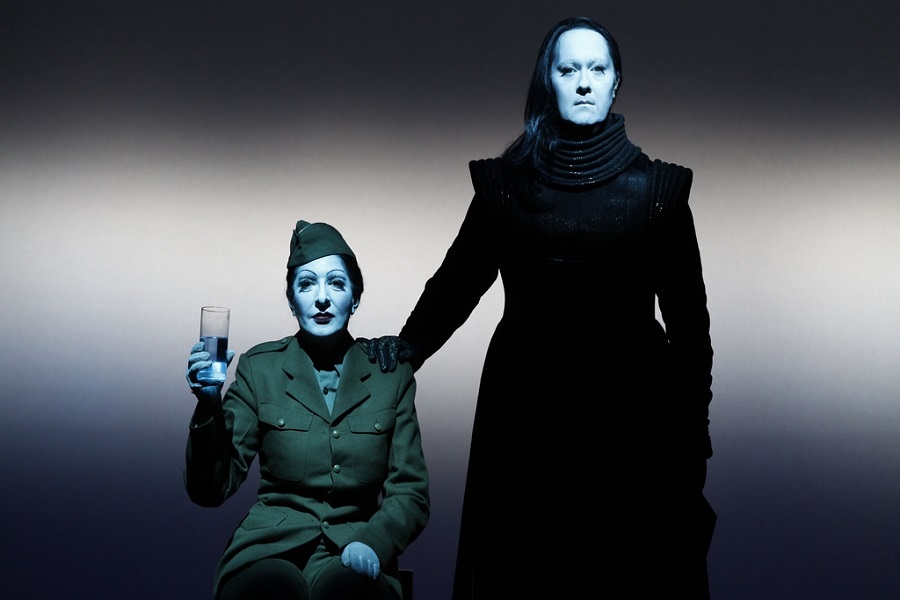
Marina Abramović y Antony en The Life and Death of Marina Abramović, www.robertwilson.com
What does such a spiritual person like you believe in?
I don't believe in Gods or religion. I really believe in energy, in divine spirit. I believe in the kind of enlightenment where you experience a complete purification of your mind and body and you lift your spirit to another level. I saw it and experienced it myself so I really believe in it.
Your art emits a lot of sexuality. How and to what extent is sexuality present in your art?
There is not just one aspect to my work there are so many layers: a social aspect, an erotic aspect, a disturbing aspect, a political aspect. I think eroticism is so important because the main energy we have in our body is sexual. Then it is up to us how we transform this sexual energy. It can be transformed through violence, war, killing, tenderness, love or spirituality. It depends how we use that energy but the fundamental, raw energy is a sexual one. Sex is as important as food. You have to eat well, have good sex; you have to live life in every single moment.
What about love?
Love has always been important in my life. I always fall in love with the wrong people, I get disappointed then I do it again. Right now I am with someone who is 21 years younger than me and it is so great that I cannot believe it is true. In our society, it is always acceptable for the woman to be younger but not the other way around. My role model is the French president’s wife who is 25 years older than he is. The press cannot accept it so they have to make him look homosexual. Society cannot accept that women can be older. I don't care about these rules. My boyfriend told me he forbids me to die before him. Love makes you so vital, so happy. Women who are 70 think everything is dead which is not true at all. The best erotic life I have had was after the menopause. So yes, sexuality is important. In my 20s, 30s and 40s I was criticized for my art, especially by men. Now in my 60s and 70s I am criticized by women. It is amazing that they think you are not supposed to look good and feel happy when you are 70. It is incredible how much hostility there is. I have always been out of the box and I will always continue to be that way. Although this is not allowed because society wants you to be a certain way.
How do you fight that hostility?
One thing that is really important in a human’s life and an artist’s life is humor. You have to learn to laugh. In order to do that you need to learn to laugh at yourself first. You should not think you are the most important person in the world. You have to put your ego aside and be humble. We are all little grains of dust in the cosmos.



